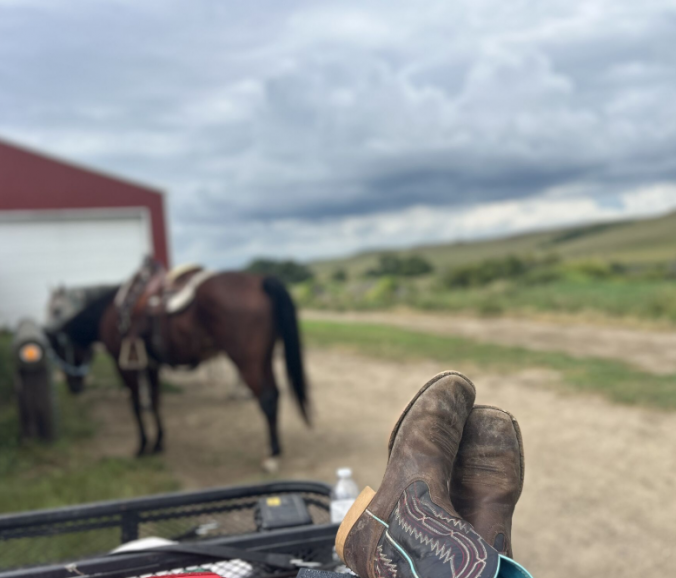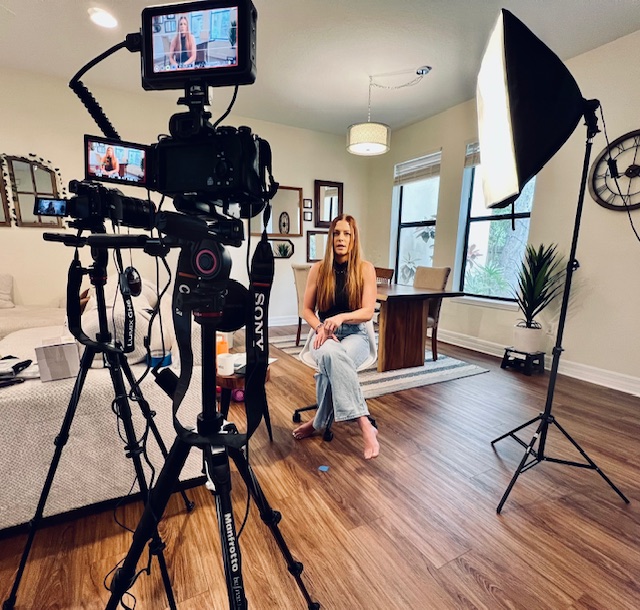Lately, I’ve noticed a theme showing up in many of my personal and professional conversations. Different stories, different people, but the same core message. Then I heard an interview that put it into words perfectly…
“The biggest killer of a relationship is abandoning yourself to create peace in the relationship.”
Read that again.
Because whether it’s your marriage, your friendships, your family, your coworkers, or your team, self-abandonment happens more than we realize.
We abandon ourselves for peace.
We stay quiet to avoid conflict.
We make ourselves smaller to make someone else comfortable.
We keep showing up, even when our needs stopped being met a long time ago.
We put our heads down and go on autopilot.
And although shrinking to avoid conflict or discomfort may feel peaceful in these moments, peace built on self-abandonment isn’t peace at all. It’s survival.
⸻
If we allow ourselves to, we can take a pause, reflect on our own patterns, and see how we show up (and also how we disappear). Understanding the patterns we hold and why helps us to learn more about who we are and what we want/expect in our relationships.
We all have patterns in our personal relationships: the fixer, the peacemaker, the doer-of-all-things, the caretaker, the quiet one. These patterns develop overtime for many reasons, such as our upbringings, personal expectations, and issues or compromises in our relationships.
I see patterns play out in teams and partnerships too. People who pour from empty cups, convinced that self-sacrifice is the only way to hold things together. I often talk in trainings about my own pattern of extreme self-sacrifice used as a distraction from what I had going on in the inside. The more I worked = the less I thought about the horrors of my work because I was so distracted with being busy. But the more self-sacrifices I made, the more people learned my pattern which was to always depend on me. I showed up for others before myself, I would work myself to death, and I was constantly fatigued of giving compassion. Once I developed that pattern, I had no capacity to say no to people because they knew I would be there. I thought it more peaceful to continue down this path of self-sacrifice than to be honest about how it was impacting me. Letting people down was a brutal thought, as was slowing down, because then I had to actually process what I was seeing and hearing at work every day.
But here’s the truth and something to repeat a few times: you can’t build connection on disconnection from yourself.
Something I had to ask myself when I started being honest about my own patterns in personal and professional relationships was, what part of me have I been abandoning to keep the peace?
⸻
And with these patterns comes the roles we play, and every personal relationship has them.
Some of our roles and the patterns that come with it are spoken, and can be positive: the leader, the helper, the calm one.
But others are unspoken: the one who never complains, the one who forgives everything at the expense of their own feelings, the one who carries the weight even when they don’t want to, the one who does it all but isn’t appreciated.
We often step into these roles out of love or habit. But after a while, they start to define us more than we define them.
One role I created for myself was the “strong one”…Carrying the weight of everything on my shoulders: everything had to go right, everything was mine to fix, I cannot mess this up, I have to be available. The patterns that came with my role of the “strong one” was to always show up with confidence. The one who got things done. The one who wasn’t impacted by anything, and who followed through and never needed help. The one who had time and space for whatever you needed. And then one day, I realized I had trained everyone around me to stop checking in; it was my own patterns that created this role.
A good question to ask ourselves is, who assigned me this role (them or me?), and do I still want it? When we ask ourselves these questions, it’s important to know that you are allowed to choose a different part to play. Yes, it’s hard. Yes, it throws others for a loop. Oftentimes, those are the burdens we avoid: the difficult conversations, the awkward adjustments, the arguments. But the alternative is to keep living in a pattern we do not want or we’ve outgrown. We can either ask ourselves the hard questions, have the difficult conversations, set boundaries, or keep on this autopilot of suffering or unhappiness that we’ve developed through these roles.
The growth that comes with doing the hard work is worth the benefit of being authentic to who you are and what you deserve.
⸻
When we avoid honest conversations with ourselves and others, or allow others to continue in their own patterns that are not compatible with ours, silence becomes our default. We get quiet and we stop speaking up. We, or they, may still care but have learned that “peace” is easier than truth.
But silence builds resentment.
And resentment builds distance.
Resentment is often the first signal that we’ve been abandoning ourselves. It’s your mind saying, “I’m tired of pretending I’m okay.”
The unaddressed stress and frustration don’t disappear; they get stored. And the same is true in relationships – every time you swallow your truth, it piles up.
Eventually, it spills out usually in the wrong direction with the wrong language, or at the wrong person, and at the wrong time. Or, frankly, we just live in dissatisfaction and anger which leads to that resentment.
It’s important to ask yourself, where am I pretending I’m fine just to keep things calm? When we notice the circumstances in which we say we are fine and aren’t is where we may find the place where resentment lives.
⸻
And sometimes, it’s okay if we have outgrown the relationship, the job, the friendship. If we notice that we are staying silent or we are still being put in a role we don’t want, use this as clarity…It is okay if we do not want to shrink any more. We get to choose if the lack of peace and authenticity is worth weathering the storm for, or instead to peacefully move forward and close this chapter.
Whether it’s your spouse/partner, your colleague, or your best friend, communication and honesty is the bridge. Sometimes it’s as simple as shifting our language and trying new approaches to the conversation. Maybe being more direct, more vulnerable, softer, more specific…It can give the other person(s) a chance to show up differently. Vocalizing to our spouses, colleagues, or family members the roles we do not want to play anymore is setting a boundary.
Boundaries bring you back.
A boundary isn’t punishment, it’s protection.
It says, “I can love you and still need space.”
It says, “I can care about you and still care for myself.”
It says, “I can love my job but still take a break.”
It says, “This isn’t right for me anymore and that’s okay”
Boundaries are a love language. They teach people how to treat you and understand you better. They teach us to be authentic and be honest about our own needs.
It’s challenging ourselves to start to identify the places where we have been abandoning ourselves and then setting small boundaries in those places.
This type of honesty and clarity is what creates peace.
⸻
The beautiful thing about self-awareness is that it gives us a choice.
You don’t have to keep abandoning yourself for peace. You can build peace that includes you. It’s challenging, especially those of us who are people pleasers, to do this. But isn’t life supposed to be enjoyable? And doesn’t that include being able to go through life feeling fulfilled, being ourselves? Not to mention, those around us benefit from getting the best version of us when we prioritize our peace, because we are happier.
Healing doesn’t always mean leaving; sometimes it means re-entering a relationship differently. Showing up as your full self, not just the convenient version of you.
And when healing does include leaving, it’s a good reminder that we step more into ourselves and where we want to be in life when we can remove what no longer serves us.
Whether it’s with a partner, a parent, a friend, or your team, you deserve to be honest, appreciated and loved. Both respected and heard. Both peaceful and present. Equal partnership in all areas in our lives is valuable.
⸻
I also believe that peace without authenticity will always feel a little bit lonely. Let that be your motivation to prioritize you. The next time you find yourself shrinking, silencing, or sacrificing parts of who you are, remember…
“The biggest killer of relationships is abandoning yourself to create peace in the relationship.”
Don’t kill the relationship trying to keep it alive. Don’t burn yourself out trying to change patterns in places where it is better to move on. Don’t become smaller for someone else’s comfort. Don’t lose yourself when trying to appease everyone else.
Choose peace that includes you.
“Peace is not something you wish for. It is something you make, something you are, something you do, and something you give away”.
-keep shining
Find me: Facebook, Instagram, Pinterest, LinkedIn





Recent Comments